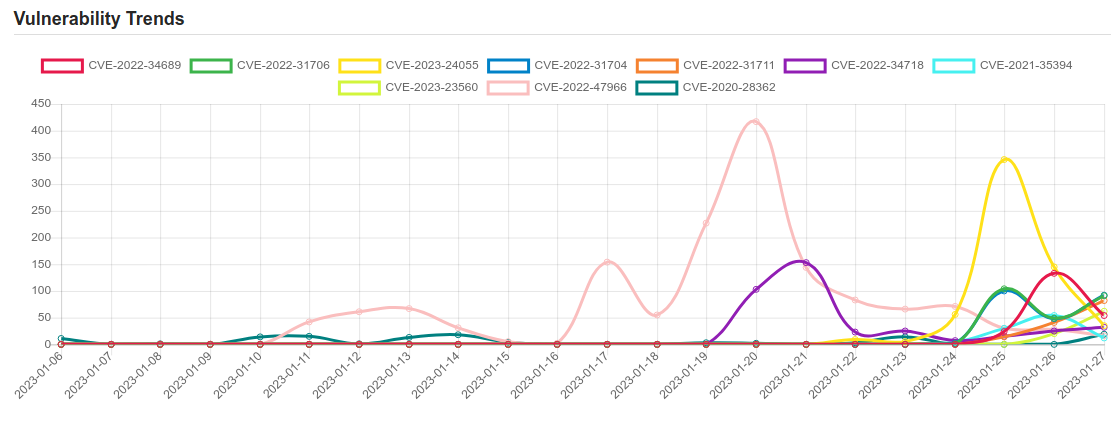Daily Vulnerability Trends: Sat Jan 28 2023

| CVE NAME | CVE Description |
| CVE-2022-3094 | Sending a flood of dynamic DNS updates may cause `named` to allocate large amounts of memory. This, in turn, may cause `named` to exit due to a lack of free memory. We are not aware of any cases where this has been exploited. Memory is allocated prior to the checking of access permissions (ACLs) and is retained during the processing of a dynamic update from a client whose access credentials are accepted. Memory allocated to clients that are not permitted to send updates is released immediately upon rejection. The scope of this vulnerability is limited therefore to trusted clients who are permitted to make dynamic zone changes. If a dynamic update is REFUSED, memory will be released again very quickly. Therefore it is only likely to be possible to degrade or stop `named` by sending a flood of unaccepted dynamic updates comparable in magnitude to a query flood intended to achieve the same detrimental outcome. BIND 9.11 and earlier branches are also affected, but through exhaustion of internal resources rather than memory constraints. This may reduce performance but should not be a significant problem for most servers. Therefore we don’t intend to address this for BIND versions prior to BIND 9.16. This issue affects BIND 9 versions 9.16.0 through 9.16.36, 9.18.0 through 9.18.10, 9.19.0 through 9.19.8, and 9.16.8-S1 through 9.16.36-S1. |
| CVE-2023-23504 | No description provided |
| CVE-2023-22482 | Argo CD is a declarative, GitOps continuous delivery tool for Kubernetes. Versions of Argo CD starting with v1.8.2 and prior to 2.3.13, 2.4.19, 2.5.6, and 2.6.0-rc-3 are vulnerable to an improper authorization bug causing the API to accept certain invalid tokens. OIDC providers include an `aud` (audience) claim in signed tokens. The value of that claim specifies the intended audience(s) of the token (i.e. the service or services which are meant to accept the token). Argo CD _does_ validate that the token was signed by Argo CD’s configured OIDC provider. But Argo CD _does not_ validate the audience claim, so it will accept tokens that are not intended for Argo CD. If Argo CD’s configured OIDC provider also serves other audiences (for example, a file storage service), then Argo CD will accept a token intended for one of those other audiences. Argo CD will grant the user privileges based on the token’s `groups` claim, even though those groups were not intended to be used by Argo CD. This bug also increases the impact of a stolen token. If an attacker steals a valid token for a different audience, they can use it to access Argo CD. A patch for this vulnerability has been released in versions 2.6.0-rc3, 2.5.6, 2.4.19, and 2.3.13. There are no workarounds. |
| CVE-2022-46689 | A race condition was addressed with additional validation. This issue is fixed in tvOS 16.2, macOS Monterey 12.6.2, macOS Ventura 13.1, macOS Big Sur 11.7.2, iOS 15.7.2 and iPadOS 15.7.2, iOS 16.2 and iPadOS 16.2, watchOS 9.2. An app may be able to execute arbitrary code with kernel privileges. |
| CVE-2013-3900 | The WinVerifyTrust function in Microsoft Windows XP SP2 and SP3, Windows Server 2003 SP2, Windows Vista SP2, Windows Server 2008 SP2 and R2 SP1, Windows 7 SP1, Windows 8, Windows 8.1, Windows Server 2012 Gold and R2, and Windows RT Gold and 8.1 does not properly validate PE file digests during Authenticode signature verification, which allows remote attackers to execute arbitrary code via a crafted PE file, aka “WinVerifyTrust Signature Validation Vulnerability.” |
| CVE-2023-0297 | Code Injection in GitHub repository pyload/pyload prior to 0.5.0b3.dev31. |
| CVE-2017-11357 | Progress Telerik UI for ASP.NET AJAX before R2 2017 SP2 does not properly restrict user input to RadAsyncUpload, which allows remote attackers to perform arbitrary file uploads or execute arbitrary code. |
| CVE-2022-21225 | Improper neutralization in the Intel(R) Data Center Manager software before version 4.1 may allow an authenticated user to potentially enable escalation of privilege via adjacent access. |
| CVE-2022-3736 | BIND 9 resolver can crash when stale cache and stale answers are enabled, option `stale-answer-client-timeout` is set to a positive integer, and the resolver receives an RRSIG query. This issue affects BIND 9 versions 9.16.12 through 9.16.36, 9.18.0 through 9.18.10, 9.19.0 through 9.19.8, and 9.16.12-S1 through 9.16.36-S1. |
| CVE-2022-34689 | Windows CryptoAPI Spoofing Vulnerability. |
| CVE-2022-31706 | The vRealize Log Insight contains a Directory Traversal Vulnerability. An unauthenticated, malicious actor can inject files into the operating system of an impacted appliance which can result in remote code execution. |
| CVE-2023-24055 | ** DISPUTED ** KeePass through 2.53 (in a default installation) allows an attacker, who has write access to the XML configuration file, to obtain the cleartext passwords by adding an export trigger. NOTE: the vendor’s position is that the password database is not intended to be secure against an attacker who has that level of access to the local PC. |
| CVE-2022-31704 | The vRealize Log Insight contains a broken access control vulnerability. An unauthenticated malicious actor can remotely inject code into sensitive files of an impacted appliance which can result in remote code execution. |
| CVE-2022-31711 | VMware vRealize Log Insight contains an Information Disclosure Vulnerability. A malicious actor can remotely collect sensitive session and application information without authentication. |
| CVE-2022-34718 | Windows TCP/IP Remote Code Execution Vulnerability. |
A considerable amount of time and effort goes into maintaining this website, creating backend automation and creating new features and content for you to make actionable intelligence decisions. Everyone that supports the site helps enable new functionality.
If you like the site, please support us on Patreon using the button below

To keep up to date follow us on the below channels.






![Cobalt Strike Beacon Detected - 139[.]9[.]135[.]76:443 8 Cobalt-Strike](https://www.redpacketsecurity.com/wp-content/uploads/2021/11/Cobalt-Strike-300x201.jpg)
